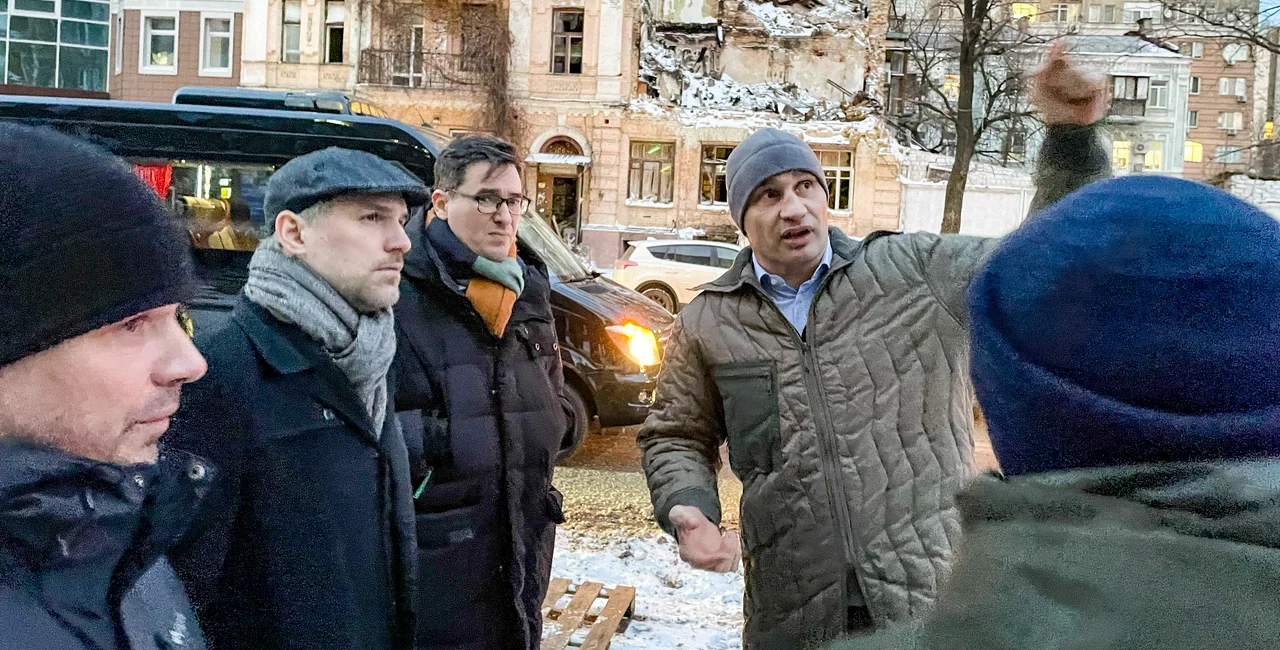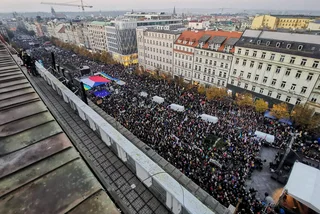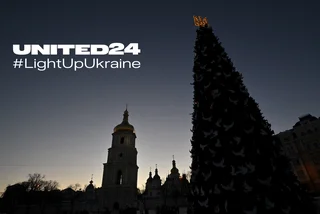Mayors of Prague, Warsaw, Bratislava, and Budapest traveled to Kyiv to meet Mayor Vitali Klitschko and express solidarity with the Ukrainian people amid the Russian invasion. The main topics of the trip included deepening cooperation in humanitarian aid, support for refugees, post-war reconstruction planning, and strengthening the security and crisis preparedness of the participating capitals.
Pact of Free Cities
Prague Mayor Zdeněk Hřib posted pictures on social media showing Klitschko accompanying the group on the streets of Kyiv. Hřib wrote that four mayors had accepted Klitschko's invitation to hold a joint meeting and visit Kyiv, adding that they expressed full support for Ukraine and discussed further cooperation on behalf of the Pact of Free Cities.
The Pact of Free Cities, which was signed by Prague, Budapest, Bratislava, and Warsaw in 2019, aims to protect and promote freedom, human dignity, democracy, and the rule of law, and calls for cooperation in housing and climate change.
StojÃme plnÄ› za Ukrajinou a jejÃmi mÄ›sty! 🇨🇿🇺🇦
— ZdenÄ›k HÅ™ib (@ZdenekHrib) January 11, 2023
Na pozvánà Vitalije KliÄka jsme dnes pÅ™ijeli s primátory VarÅ¡avy, Bratislavy a BudapeÅ¡ti na spoleÄné jednánà do Kyjeva. Za Pakt svobodných mÄ›st tu vyjadÅ™ujeme plnou podporu UkrajinÄ› a domlouváme dalÅ¡Ã vzájemnou spolupráci. pic.twitter.com/A8IyJ6yEvS
It has since been joined by dozens of cities from all over the world. The Ukrainian capital Kyiv became a member last year.
“The role of cities is crucial in helping Ukraine, which is facing genocide by Russia,” Hřib said, adding that Prague has provided shelter to Ukrainians who have had to flee due to the invasion and attacks on infrastructure.
Mayor Klitschko appreciates Prague's help, according to Hřib. “It is also our war, and that is why I also want to thank the people of Prague for the unprecedented displays of solidarity and humanity so far,” Hřib said.
Senior Events Manager

Load Controller

Sales Lead | High-Performance Computing & AI

An opportunity to share crisis management experiences
The visiting mayors can also benefit from Kyiv’s experience in crisis management of a city affected by many types of extraordinary events. “We can learn from Kyiv how to be prepared for similar terrorist attacks on critical civilian infrastructure," Hřib said.
#PactOfFreeCitites arriving at the free and proud city of Kyiv. In the heart of free and proud Ukraine.
— RafaÅ‚ Trzaskowski (@trzaskowski_) January 11, 2023
Pakt Wolnych Miast w drodze do wolnego, dumnego Kijowa. Stolicy dumnej, wolnej Ukrainy. #StandWithUkraine @Vitaliy_Klychko @matusvallo @bpkaracsonyg @ZdenekHrib pic.twitter.com/oEbgXghu2n
Warsaw Mayor Rafal Trzaskowski tweeted a picture of himself, Hřib, Bratislava Mayor Matúš Vallo, and Budapest Mayor Gergely Karácsony, with a caption that the Pact of Free Cities had arrived "at a free and proud Kyiv in the heart of a free and proud Ukraine."
Planning for the conflict's aftermath
During the meeting, Klitschko discussed the state of critical infrastructure in Kyiv. He said Russia mainly focused on civilian targets when attacking Kyiv. These attacks have caused power outages and there is a risk of damage to the water supply infrastructure in the winter months. Klitschko said that, despite the damage in the city, he remained optimistic and believed that Ukrainians will win.
The visiting mayors are also looking beyond the current conflict and seeking ways to use the potential of their cities in the post-war reconstruction of Ukraine.
The mayors visited places in Kyiv damaged by the Russian attacks and also Bucha, a city in the Ukraine district that became the symbol of Ukrainian suffering. After Russian units withdrew in March, mass graves and bodies lying directly in the streets were found there.
Hrib also met former Ukrainian Ambassador to Prague Yevhen Perebyinis and Czech Ambassador to Ukraine Radek Matula.
Support for Ukraine since the start of the war
In December, Prague donated 400 heaters and 10 generators to Kyiv, and since the beginning of the conflict, it has provided Ukrainian cities with two dozen trams, ambulances and rescue vehicles, buses, food packages, and other basic equipment and medical supplies. Prague has worked in cooperation with the NGO People in Need.
Prague also cooperates with UNICEF for long-term assistance to children and their families who have found safety in the Czech capital. UNICEF has set aside CZK 333 million for this purpose. In addition to 5,000 pallets of humanitarian aid, Warsaw also provided 60 subway cars, Budapest 15 buses, and Bratislava 25 buses, Prague City Hall said in a press release.
Hřib and Trzaskowski visited Kyiv together on Feb. 15, just before the Russian invasion on Feb. 24, but this was their first visit since the conflict began. During the first visit, both politicians expressed solidarity with Ukraine as tens of thousands of Russian soldiers at that time had gathered on the border.












 Reading time: 3 minutes
Reading time: 3 minutes 



 Norwegian
Norwegian
 French
French

























